National
Election Commission proposes two-term limit for PR candidates
In the draft bill, the poll body has proposed the provision for ‘NOTA’ and mandatory allocation of 33 percent seats for women candidates under the FPTP system, among others.
Post Report
The Election Commission has proposed various amendments to the election laws as it decides to register the ‘Bill to Amend and Consolidate the Election Law’ at the Parliament through the Ministry of Home Affairs.
A meeting of the commission on Monday decided to forward the new amendments to the government, which will register proposals at the Parliament.
As per the proposed amendment, the Election Commission has suggested that a person who has already been elected twice through the proportional representation (PR) system be barred from filing candidacy under the same electoral category.
The existing election law does not have a limit for a candidate who wants to participate in the elections through the proportional representation system.
Likewise, the commission has also proposed a provision that a candidate who has lost the elections (local, provincial or federal) shall not be allowed to file candidacy from another constituency in either of the elections for five years, except for the by-election of the respective constituency.
Moreover, the commission has included another provision that gives the voters the right to reject candidates. For that purpose, the commission has proposed a provision that gives voters a right to reject any candidate and for that, a ‘NOTA’ sign should be included in the ballot paper.
In the draft bill to amend the current election laws, the commission has proposed a provision that makes it mandatory for the political parties to field at least 33 percent women candidates under the first-past-the-post electoral system.
The Commission has stated that the changes were proposed in the new integrated election law to replace seven different existing laws based on Nepal’s constitution, the directive order of the Supreme Court and past experiences.
In the new integrated bill to be presented at the parliament, the election body has proposed 27 different changes, which commission officials expect will clear the confusion that affected the past elections and introduce some newer practices as per the expectations of the people.
Major changes proposed by the election body include updating the voters list through an electronic medium, collecting details of Nepali citizens living abroad to prepare the list, and fixing the election day and duration of publicity campaigns.
Elections officials said they included the provision to bar candidates from contesting polls repeatedly within five years in view of the widespread criticism levelled against leaders who were defeated in the elections but contested another election held within the same term.
To ensure better representation of women in the governing process, the commission has made it mandatory for political parties to field at least 33 percent of women candidates under the FPTP election system. One of the two candidates for chairperson and vice-chair or mayor and deputy mayor must be a woman, while at least 33 percent of ward chair candidates must be women.
The commission has proposed that while registering their candidacy, all candidates must submit their property details registered in the names of his/her family members.
To avoid the existing confusion about the starting and ending point of their term, the election body has proposed that it should begin from the day of election for all the elections of the House of Representatives, Provincial Assembly and local level while their term would end the day the candidacy filing for the next election begins.
For the new election law, the election body has proposed that the candidates must make all the financial transactions of their polling campaign only through the bank account listed while registering their candidacy.
To address the voting rights of Nepali citizens living abroad for various purposes, the commission has proposed that provisions should be made to allow them to vote for the PR category of the House of Representatives via diplomatic missions.
For the first time in Nepal’s election history, the commission has proposed the provision of NOTA [None of The Above] for the voters who don’t like to vote for any of the candidates, and if the NOTA crosses 50 per cent of the total valid votes, the election will be terminated.
Besides that, the commission has also proposed that public transportation needs to be managed on the election day to make the election process easier for all elections of the House of Representatives, Provincial Assemblies and the local level.




 18.12°C Kathmandu
18.12°C Kathmandu













